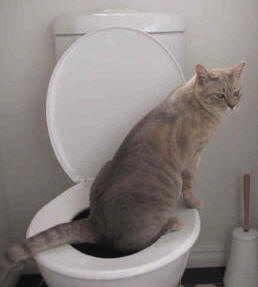The Dangers of Flushing Cat Poop Down Your Toilet - Advice for Better Disposal
The Dangers of Flushing Cat Poop Down Your Toilet - Advice for Better Disposal
Blog Article
The article in the next paragraphs in relation to Can You Flush Cat Poo or Litter Down the Toilet? is highly interesting. Don't overlook it.

Intro
As pet cat proprietors, it's essential to be mindful of just how we throw away our feline good friends' waste. While it might appear practical to flush cat poop down the bathroom, this practice can have detrimental effects for both the setting and human health and wellness.
Alternatives to Flushing
The good news is, there are much safer and much more responsible methods to throw away cat poop. Take into consideration the complying with alternatives:
1. Scoop and Dispose in Trash
One of the most common approach of getting rid of feline poop is to scoop it into a naturally degradable bag and throw it in the garbage. Be sure to make use of a committed litter inside story and throw away the waste promptly.
2. Usage Biodegradable Litter
Select eco-friendly cat litter made from materials such as corn or wheat. These trashes are environmentally friendly and can be safely gotten rid of in the trash.
3. Bury in the Yard
If you have a backyard, take into consideration burying feline waste in an assigned area far from vegetable gardens and water resources. Make sure to dig deep adequate to prevent contamination of groundwater.
4. Set Up a Pet Waste Disposal System
Invest in a family pet garbage disposal system particularly developed for pet cat waste. These systems use enzymes to break down the waste, reducing odor and environmental impact.
Wellness Risks
Along with ecological issues, purging cat waste can also pose health dangers to people. Feline feces might consist of Toxoplasma gondii, a bloodsucker that can create toxoplasmosis-- a possibly serious ailment, particularly for pregnant females and people with damaged body immune systems.
Ecological Impact
Flushing pet cat poop introduces harmful virus and bloodsuckers into the water system, presenting a substantial danger to marine environments. These contaminants can adversely affect marine life and compromise water top quality.
Final thought
Responsible family pet possession prolongs past supplying food and shelter-- it likewise entails correct waste management. By avoiding purging cat poop down the toilet and choosing different disposal approaches, we can reduce our environmental impact and safeguard human health.
Why You Should Never Flush Cat Poop Down the Toilet
A rose by any other name might smell as sweet, but not all poop is created equal. Toilets, and our sewage systems, are designed for human excrement, not animal waste. It might seem like it couldn’t hurt to toss cat feces into the loo, but it’s not a good idea to flush cat poop in the toilet.
First and foremost, assuming your cat uses a litter box, any waste is going to have litter on it. And even the smallest amount of litter can wreak havoc on plumbing.
Over time, small amounts build up, filling up your septic system. Most litter sold today is clumping; it is made from a type of clay that hardens when it gets wet. Ever tried to scrape old clumps from the bottom of a litter box? You know just how cement-hard it can get!
Now imagine just a small clump of that stuck in your pipes. A simple de-clogger like Drano isn’t going to cut it. And that means it’s going to cost you big time to fix it.
Parasitic Contamination
Believe it or not, your healthy kitty may be harboring a nasty parasite. Only cats excrete Toxoplasma in their feces. Yet it rarely causes serious health issues in the cats that are infected. Most people will be fine too if infected. Only pregnant women and people with compromised immune systems are at risk. (If you’ve ever heard how women who are expecting are excused from litter cleaning duty, Toxoplasma is why.)
But other animals may have a problem if infected with the parasite. And human water treatment systems aren’t designed to handle it. As a result, the systems don’t remove the parasite before discharging wastewater into local waterways. Fish, shellfish, and other marine life — otters in particular — are susceptible to toxoplasma. If exposed, most will end up with brain damage and many will die.
Depending on the species of fish, they may end up on someone’s fish hook and, ultimately on someone’s dinner plate. If that someone has a chronic illness, they’re at risk.
Skip the Toilet Training
We know there are folks out there who like to toilet train their cats. And we give them props, it takes a lot of work. But thanks to the toxoplasma, it’s not a good idea.

Do you really like reading up on How to Dispose of Cat Poop and Litter Without Plastic Bags? Try leaving feedback further down. We would be pleased to find out your ideas about this review. We hope to see you back again later on. If you liked our post kindly remember to pass it around. Kudos for your time. Visit us again soon.
Call Today Report this page